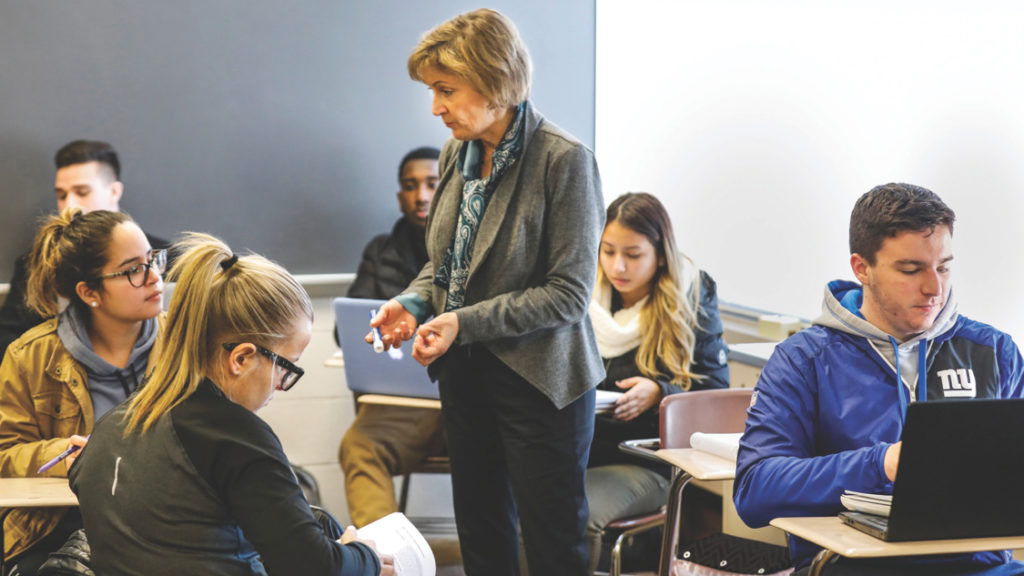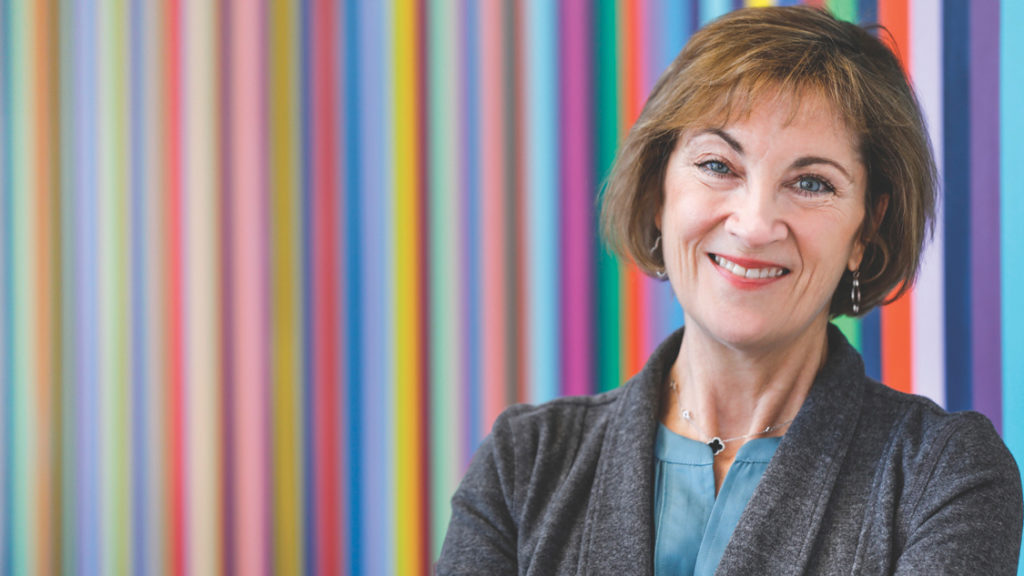Caldwell University
February 21, 2019
Prof. Virginia Rich: Innovation and Improvement are Business as Usual.
Faculty Feature:
Prof. Virginia Rich
INNOVATION AND IMPROVEMENT ARE BUSINESS AS USUAL
There is an undercurrent of energy to everything Professor Virginia Rich does. As she talks about the direction of the School of Business and CIS, where she serves as associate dean, she exudes passion for her subject. It is no surprise, then, that her department is infused with a drive to innovate and grow.
The innovations at Caldwell University’s Business School are at times huge and groundbreaking, and at others, smaller and practical, aimed at teaching the foundations of good business practices. Both matter.
“We definitely are trying to be responsive to employer and industry needs,” Rich says. “To that end, what we’re trying to do is graduate students with the skills and abilities that are needed now. It’s a practical, skills-based approach to what’s in the marketplace.”
One step the Business School is taking to ensure confidence in its ability to graduate students with those skills is to be reaccredited by the Accreditation Council for Business Schools and Programs. The organization follows the Baldridge criteria for excellence, “recognizing teaching excellence, determining student learning outcomes, and helping institutions implement continuous improvement models.” The intense process of maintaining ACBSP accreditation is worth it to Rich. “It holds us to a standard of excellence that makes us accountable for all of our business practices,” she says, “so students and their parents can be assured that we are following the best practices of the better business schools.”
That Rich can see the long-term payoff of the ACBSP accreditation is no surprise. She is a focused educator, a woman armed with a tenacity that prompts her to focus on what must be done, not on how much work is involved for her. She had that work ethic long before taking her current position.
Rich obtained her Juris Doctor from Wake Forest University. She had a judicial clerkship in the United States District Court, serving the chief judge of the New Jersey District for two years before joining a Morristown law firm as an associate; she later became a partner. She then began a master’s in teaching program before teaching at Caldwell. That was in 1999, and since then, she has taken on varied roles, including serving as chair of the Faculty Development Committee for five years.
This impressive résumé serves Rich well as she assesses the needs of the Business School. Her personal drive spills over into a department that is driven to innovate and succeed. ACBSP accreditation is one way it will do that—even if that isn’t an easy path to take.
“It has been called a workout,” Rich says of the process. “And it is. It’s good. The basis of the process is continuous improvement. They challenge us: no matter how good you are, how can you get better? It’s necessary to have these opportunities for improvement.”
Members of the Business School faculty are passionate about improving. That is why they have added programs to meet the needs and interests of students. They have recently added a health care administration degree program, which teaches students to monitor and run businesses in the growing health care marketplace. Another new program grown from a popular minor is sport management, which prepares students for the multifaceted sports industry in both professional and amateur sports. And most recently, the Business School reinstated its computer science program to meet industry needs for web programming, cyber security and app development.
“These new programs were not only responsive to industry needs,” Rich explains, “but also to student interests. We try to listen to our students, what they need and what they want. We try to be innovative with all that we do.”
Innovation, coupled with improvement, drives Rich and her team forward. Another groundbreaking initiative they have undertaken is a human resources apprenticeship program. Caldwell University now offers the first such program in New Jersey that has been recognized by the United States Department of Labor. Run in partnership with the Employers Association of New Jersey, it allows business majors who minor in human resources to begin on-the-job training in human resources in their junior years. “You can think of it as an internship on steroids,” Rich says, “but even that doesn’t do it justice.” Students work for 1,800 hours over two years as paid apprentices with participating companies. While students continue classroom work, the workplace offers on-the-job experience and training. Students who complete their hours are certified as apprentices and graduate “workforce ready,” says Rich. “New Jersey industry leaders have recognized that they need graduates with specialized skills.”
The department’s primary goal is providing students with the skills needed to operate in the business world, and faculty members are constantly striving to ensure they are preparing students for life after graduation. And while they consider opportunities to expand the apprenticeship program beyond the human resources industry, they continue to teach practical skills that will pay long-term dividends for all students in the School of Business and CIS.
Professors regularly teach students interaction skills. This involves the art of introducing themselves, making small talk, and more. In a 100-level course, business students will leave their classroom to visit another class where they are invited to speak to students they may never have met and to hone their interpersonal skills.
“Some of the faculty have provided class time to help students practice introducing themselves. We’ll bring our students to another class and have the students ‘meet’ each other,” Rich explains with a smile. “We practice handshaking, eye contact, introductions and small talk. It’s a strategy that can be taught. The more we do it, the more comfortable we are.”
The practical side of business education doesn’t end there. Rich and Caldwell staff and faculty also host mock business dinners where students learn how to conduct themselves over meals. Since this is an essential part of doing business in the real world, the skills students learn are invaluable. At the dinners, sponsored by Caldwell’s Gourmet Dining, staff and faculty members share what Rich calls “tricks of the trade,” like where a person should sit, who sits down first, what to order, which fork to use, and more during a meal. The attention to practical skills pays off.
“We need to know how to present ourselves. We need to know the very fundamentals of introducing ourselves, of being comfortable,” Rich says, listing other important skills students are taught. “Being responsive to requests for information, to all kinds of communications, managing time and tasks. Those are fundamental.”
Fundamental. Many of the things Rich feels a student deserves to learn are unique to Caldwell University. In this innovative environment, faculty members are encouraged to constantly evolve and grow so they can educate students in the most complete way possible.
Rich, a parent of a recent college graduate, sees the potential in her students and strives to help them achieve their goals.
“As parents, we try to inspire our children to stretch and go beyond their comfort zone, and we try to do the same thing here with our students. We try to be aspirational and help them to go higher and be the best that they can be, to continue to develop and create a life worth living.”
It is unlikely Rich would single herself out as a major reason the department she leads is thriving. She is constantly shifting the focus to the other faculty and administration members who contribute. She points to the joys of working for a liberal arts institution where students are given a broad education that allows adaptability in the workplace and the ability to lead a balanced life. She mentions President Nancy Blattner, who encourages the faculty to think outside the box. Rich celebrates the faculty and staff in her department, who she says are “integral to our success.”
But her personal mark is unmistakable. Her drive, her energy and her passion for her students are evident in every decision she makes to move the School of Business and CIS forward. Rich’s attention to practical details and her enthusiasm for major innovation ensure her department will continue to offer programs that graduate students who are prepared for careers in the business world. That is always Rich’s priority.
“Keep in mind at all times what it is that we are doing, educating students,” she says. “Educating students to be ready and able for the workplace. To help them out with sustainable skills that will allow them to adapt to the changing marketplace and what is needed out there. That’s the key.” n
—Nicole M. Burrell ’09
Professor Rich comments on the School of Business and CIS in the #METOO Era:
“Ethical behavior starts with sincerity. And transparency. And respect. I think that everything about the #MeToo movement and all that’s associated with equal pay for equal work and equal treatment on the job, all of those things at their fundamental core are about respect. It’s respect for the other person as a human and respect for their abilities. I think that is what everyone is crying out for. People want to be respected for what they’re doing on the job. They don’t want to be objectified, and they don’t like to be treated in a way that is disrespectful. And that is even before we get to something as horrific as sexual assault. But even on a fundamental level, if we come to every interaction with the idea of respecting the dignity of the person that we’re meeting, and finding out what we can about them, I think that many of those issues—if we could all just do that—would melt away.”
on the ethics of Caldwell University students:
“When I think about some of the feedback that we’ve gotten over the years, consistently, one thing comes out again and again. Our students have not only a work ethic, but they have ethics. Our students work hard, they’re well prepared, and they make good decisions. Good ethical decisions. We can just look to the liberal arts base and what we are as an institution and know that we certainly try to instill that in students. That when you go out there, you are the face of Caldwell on the job. You need to be aware of that and live up to that. Because that is something to live up to.”







